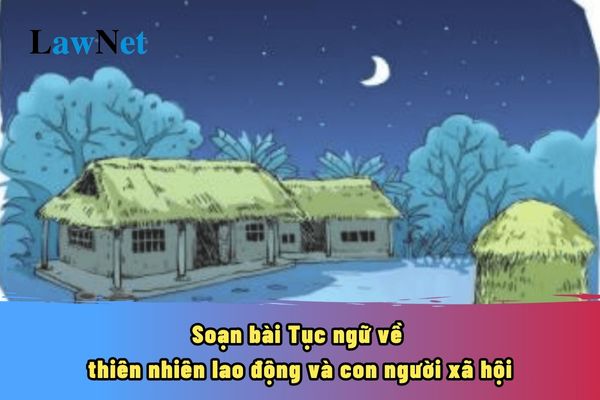What are the guidelines for preparing the lesson "Vietnamese proverbs about nature, labor, and social human beings"? Is Music a compulsory subject for 7th-grade students in Vietnam?
What are the guidelines for preparing the lesson "Vietnamese proverbs about nature, labor, and social human beings"?
Students can refer to the following guidelines for preparing the lesson "Vietnamese proverbs about nature, labor, and social human beings":
|
Guidelines for preparing the lesson "Vietnamese proverbs about nature, labor, and social human beings"
|
*Note: The information is for reference only./.

What are the guidelines for preparing the lesson "Vietnamese proverbs about nature, labor, and social human beings"? Is Music a compulsory subject for 7th-grade students in Vietnam? (Image from the Internet)
Is Music a compulsory subject for 7th-grade students in Vietnam?
According to Section 1 of Part 4 of the General Education Program issued together with Circular 32/2018/TT-BGDDT:
1. Basic Education Stage
1.1. Primary Level
a) Educational content
Compulsory subjects and educational activities: Vietnamese; Mathematics; Ethics; Foreign Language 1 (in grades 3, 4, 5); Natural and Social Sciences (in grades 1, 2, 3); History and Geography (in grades 4, 5); Science (in grades 4, 5); Information Technology and Technology (in grades 3, 4, 5); Physical Education; Arts (Music, Fine Arts); Experiential activities.
Elective subjects: Ethnic minority languages, Foreign Language 1 (in grades 1, 2).
b) Educational duration
Conduct classes for 2 sessions/day, each day arranging no more than 7 lessons; each period is 35 minutes. Educational institutions not qualified for conducting classes 2 sessions/day follow the educational plan guided by the Ministry of Education and Training.
...
1.2. Lower Secondary Level
a) Educational content
Compulsory subjects and educational activities: Literature; Mathematics; Foreign Language 1; Civic Education; History and Geography; Natural Sciences; Technology; Information Technology; Physical Education; Arts (Music, Fine Arts); Experiential activities, career orientation; Local educational content.
Elective subjects: Ethnic minority languages, Foreign Language 2.
b) Educational duration
Attend class 1 session/day, each session not arranging more than 5 lessons; each period is 45 minutes. Schools qualified are encouraged to conduct classes 2 sessions/day according to the guidance of the Ministry of Education and Training.
...
The compulsory subjects and educational activities for 7th-grade students include: Literature; Mathematics; Foreign Language 1; Civic Education; History and Geography; Natural Sciences; Technology; Information Technology; Physical Education; Arts (Music, Fine Arts); Experiential activities, career orientation; Local educational content.
Thus, Music is one of the compulsory subjects for 7th-grade students in Vietnam.
Is insulting the dignity of classmates a prohibited act for 7th-grade students in Vietnam?
According to Article 37 of the lower secondary school, upper secondary school and multi-level school charter issued with Circular 32/2020/TT-BGDDT, there are 07 prohibited acts for 7th-grade students:
1. Disrespect the dignity, honor or bodily integrity of teachers, officials and staff of their schools, other people and other students.
2. Act dishonestly in learning, examinations or admission process.
3. Buy, sell or use alcohol, tobacco, drugs, other stimulants, firecrackers or explosives.
4. Use mobile phones and other devices in class for purposes other than learning and without the teacher's permission.
5. Fight or disrupt public or school order or security.
6. Use or exchange cultural products that incite violence or contain indecent materials; use toys or play games that impede their own healthy development.
7. Students shall not commit other prohibited acts provided for by regulations of law.
Thus, insulting the dignity of classmates is a prohibited act for 7th-grade students in Vietnam according to the regulations.

